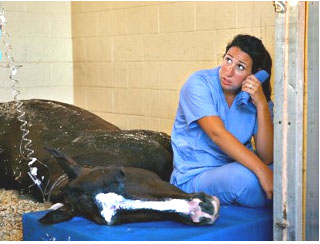By Nelson Hernandez and Ann Scott Tyson (Boston Globe); Axis of Logic commentary
Boston Globe. Axis of Logic
Editor's Note: While no mention of the sudden death of the 21 Venezuelan polo horses in Florida is mentioned in this report, the timing and relevelance to this event cannot be ignored. The Boston Globe ignores the dead polo ponies, ending their report with an obscure reference to the anthrax attacks in 2001. Wikipedia explains Venezuelan equine encephalitus:
"Venezuelan equine encephalitis virus is a mosquito-borne viral pathogen that causes Venezuelan equine encephalitis or encephalomyelitis (VEE). VEE can affect all equine species, such as horses, donkeys, and zebras. After infection, equines may suddenly die or show progressive central nervous system disorders."
 |
| 21 Venezuelan polo horses got sick and died overnight just before a Florida polo match and officials said Monday they may have been killed by some type of poison. Brandon Kruse |
There has been a great deal of speculation about the cause and motivation behind the sudden death of the Venezuelan polo ponies in Florida. So far, everything revealed points to a poisoning of the horses. Motivation? Readers have suggested every thing from a Miami mafia operation, to an attack by the Venezuelan opposition, to killing of the horses to prevent Venezuela (a favorite in the competition) from winning ($$$). One counter-revolutionary Axis reader, defying all reason, even suggested that President Chavez had something to do with it. This Boston Globe article may add another small piece of information about the ongoing investigation. Yesterday, in a Venezuelan restaurant, the 6 Venezuelans I interviewed on the subject, agreed (including Chavistas and members of the opposition) that money was the primary factor involved. What do you think? Was it political? Was it money? Was it about Venezuela's image as a projected winner on the world stage, once again? Please provide your thoughts and insight in the readers comment section below.
- Les Blough, Editor
WASHINGTON - The US Army Medical Research Institute of Infectious Diseases in Frederick, Md., is under investigation by the Army's Criminal Investigation Command for the possible disappearance of some of its stock of deadly pathogens, an Army spokesman said.
The Frederick News-Post reported yesterday that since at least February, agents have been trying to discover what happened to pathogens that may have gone missing from 1987 to 2008. The investigation coincides with the suspension of most research at the Army lab in February as authorities attempt to find errors in an inventory of their biological materials.
Christopher Grey, public affairs chief for the Criminal Investigation Command, confirmed yesterday that the command is investigating the possibility of missing virus samples from the institute. "We have an ongoing investigation at Fort Detrick," Grey said, but he declined to say when the investigation began or when it is likely to be completed.
The investigation seems to center on missing samples of Venezuelan equine encephalitis, a mosquito-borne virus that usually causes a mild flulike illness but can also cause brain inflammation and death. It has potential for use as a biological weapon, but is far less lethal than some other agents the lab works with, such as anthrax bacteria and Ebola virus.
The News-Post cited two support staff members who said they had been questioned by investigators from Fort Meade, Md., about missing samples of the virus. Alan Schmaljohn, a longtime scientist at the lab who now works for the University of Maryland, said he had also been questioned two or three months ago as someone who once had access to the virus.
"They caught me on my cellphone on the road and I stopped and talked to them for quite a long time," Schmaljohn said.
Schmaljohn said it wasn't clear from the questions exactly what the investigators sought, though he believed they wanted to know what happened to three missing vials carrying small quantities of the virus.
"The number of vials is utterly meaningless," Schmaljohn said. "Three vials missing is no indication of any evildoing. . . . It's almost equivalent to saying you're missing 3 cents out of the national budget. . . . From the scientists' point of view it is inconsequential, but from the regulator's point of view it is an indication of sloppiness, and they are finally going to take rugged action."
A problem in accounting for Venezuelan equine encephalitis was what triggered the earlier suspension of most research at the lab. A spot check in January found 20 samples of the virus in a box of vials instead of the 16 that had been listed in the institute's database, Caree Vander Linden, the spokeswoman for the institute, said in February.
The lab has been under heavy pressure to tighten security since anthrax attacks in 2001 that killed five people and sickened 17 others. FBI investigators think the anthrax strain used in the attacks originated at the Army lab, and its prime suspect, Bruce E. Ivins, researched anthrax there. Ivins committed suicide last year.
Washington Post

